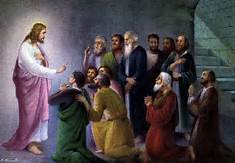Paul Charged by the Jews: Part 3 of 3
by John Lowe
(Woodruff, S.C.)

1 Gallio was born in Spain, and later taken to Rome by his father during the reign of Tiberius and educated for a diplomat’s career. He was the elder brother of Seneca, the famous philosopher-statesman, who described him as being of an unusually amiable disposition. Gallio’s career took him through the usual steps of serving as a praetor, then a proconsul, and finally rising to the rank of consul.
2 Shortly after his Corinthian tenure, Gallio seems to have contracted a rather serious illness that plagued him for the rest of his life. He was executed in the latter half of the 60’s, a victim of Nero’s paranoia.
3 Under the Roman Empire, the name of acclamations was given to the praises and flatteries which the senate bestowed upon the emperor and his family. These acclamations, which are frequently quoted by the Scriptores Historiae Augustae, were often of considerable length, and seems to have been chanted by the whole body of senators.
4 The church was not made up of many mighty and noble people (1 Corinthians 1:26-31), but of sinners whose lives were transformed by the grace of God (1 Corinthians 6:9-11).
5 Appeal to the concept of religio licita is somewhat precarious, the view that the Romans kept a list of accepted foreign religions and that the Jews were attempting to divorce themselves from Christians, thus making the latter an officially unrecognized religion. No first-century evidence exists that the Romans kept such a list. The Jews were given privileges by Claudius assuring them of freedom of worship and protection from official harassment. Because of their identity with Judaism, the early Christians would have perhaps enjoyed some benefit from this.
6 There is some doubt whether Gallio would have held court in such a public place, and we know from similar cases that Roman provincial courts were usually held in a basilica or in the praetorium. If this was so now, then the so-called north basilica beside the Lecheum Road suggests itself as a possible location.
7 (1 Corinthians 1:1, NIV) “Paul, called to be an apostle of Christ Jesus by the will of God, and our brother Sosthenes.”
8 (Acts 25:10-12, NIV) “Paul answered: “I am now standing before Caesar’s court, where I ought to be tried. I have not done any wrong to the Jews, as you yourself know very well. If, however, I am guilty of doing anything deserving death, I do not refuse to die. But if the charges brought against me by these Jews are not true, no one has the right to hand me over to them. I appeal to Caesar!” After Festus had conferred with his council, he declared: “You have appealed to Caesar. To Caesar, you will go!”
No content on preachology.com may be printed or
copied to any other site without permission.
|
The Preaching Ezine Subscribe to my free newsletter for monthly sermons and get a free book right now. Just follow the link above and get the details! |
|
Sermon Supply Ministry
Be ready for Sunday…before Saturday night! |
|
Manna Seminary
Did you ever want to start or finish your Ministry Training? |
|
YOUR PAGES: by sharing YOUR great sermons! by sharing YOUR great poems! |



